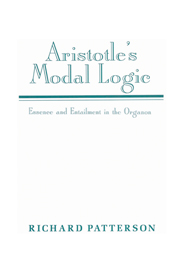Book contents
- Frontmatter
- Contents
- Acknowledgments
- Chapter 1 Introduction
- Chapter 2 The basic modal proposition
- Chapter 3 Syllogisms with two necessity premises
- Chapter 4 Mixed syllogisms: one assertoric and one necessity premise
- Chapter 5 Two-way possibility: some basic preliminaries
- Chapter 6 Two-way possibility syllogisms
- Chapter 7 Aristotle's perfect syllogisms
- Chapter 8 Principles of construction
- Appendix Categorical propositions and syllogisms
- Notes
- Select bibliography
- Index
Chapter 1 - Introduction
Published online by Cambridge University Press: 14 November 2009
- Frontmatter
- Contents
- Acknowledgments
- Chapter 1 Introduction
- Chapter 2 The basic modal proposition
- Chapter 3 Syllogisms with two necessity premises
- Chapter 4 Mixed syllogisms: one assertoric and one necessity premise
- Chapter 5 Two-way possibility: some basic preliminaries
- Chapter 6 Two-way possibility syllogisms
- Chapter 7 Aristotle's perfect syllogisms
- Chapter 8 Principles of construction
- Appendix Categorical propositions and syllogisms
- Notes
- Select bibliography
- Index
Summary
BACKGROUND TO THE PRINCIPAL ISSUES
The chapters of the Prior Analytics devoted to modal arguments are notoriously difficult, controversial, and, according to numerous weighty authorities, deeply confused. Accordingly, one major aim of this study will be to examine in detail the internal workings of Aristotle's modal logic – his logic not just of statements simply asserting the application of a predicate to a subject but also of those asserting a necessary or possible or contingent relation between subject and predicate – in order to understand and assess its strengths and its weaknesses. A second aim will be to establish a fundamental connection between Aristotle's metaphysical essentialism (along with his theory of scientific demonstration) on the one hand and his modal logic on the other. These two goals are closely connected, or so it will be argued here, in that the logical system itself must be understood from the start in the light of basic points of syntax and semantics deriving from Aristotle's views on what there is and on the various ways in which we can speak and reason about what there is.
There has always been healthy interest in Aristotle's metaphysical essentialism – interest heightened recently by work on essentialism as such, and especially by work deriving, like Aristotelian essentialism, from intuitions about the natures or essences of things. Such developments have contributed at least indirectly to the study of Aristotle by provoking careful thought about how essentialism might be formulated and how different objects (individual living things, the “natural kinds” of chemistry or physics or biology, sets, numbers) might involve very different sorts of essential properties, discoverable only through a variety of approaches.
- Type
- Chapter
- Information
- Aristotle's Modal LogicEssence and Entailment in the Organon, pp. 1 - 14Publisher: Cambridge University PressPrint publication year: 1995
- 1
- Cited by



